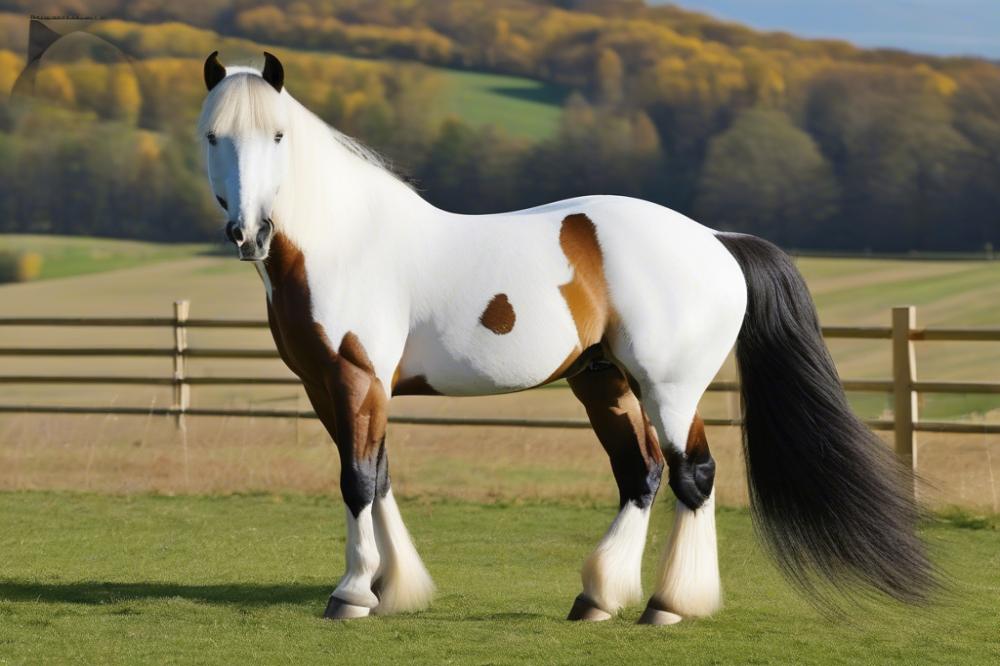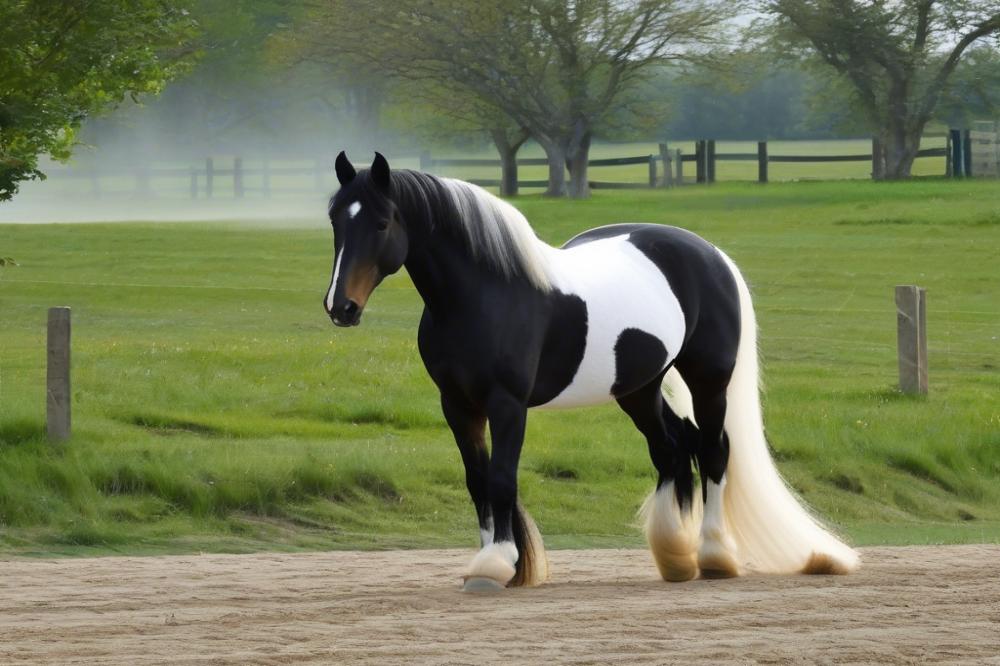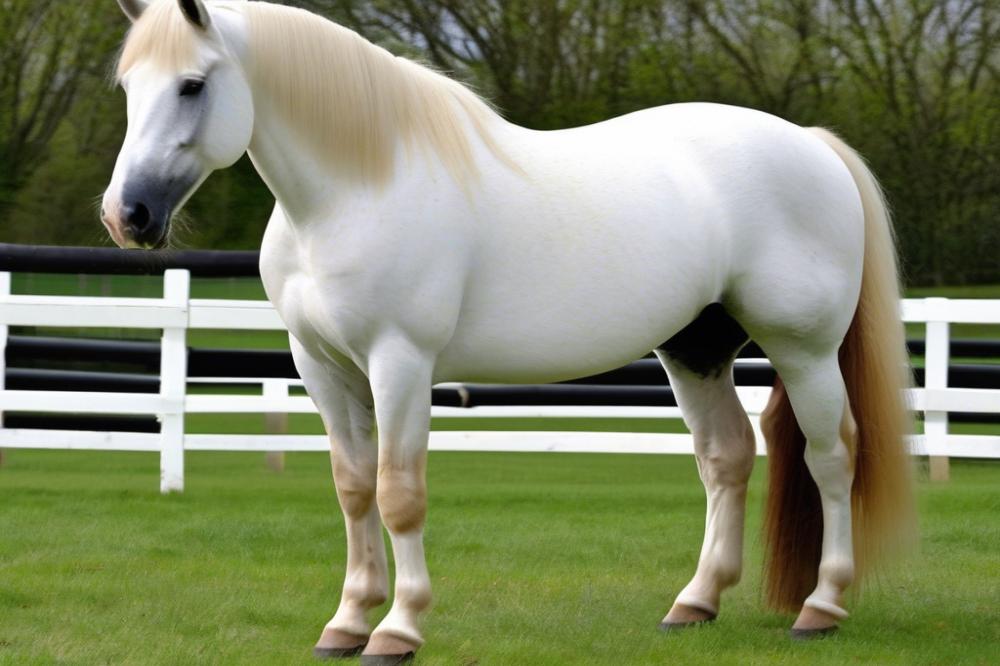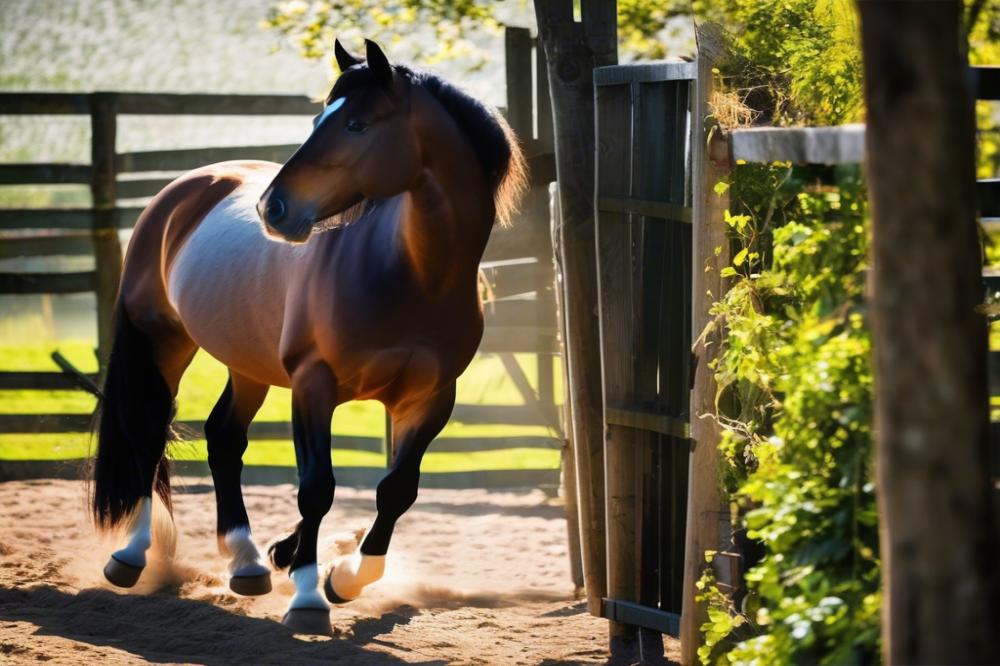What Is a Cob Horse?
When we talk about cob horses, we’re diving into a fascinating world of sturdy steeds that have a rich history and plenty of charm. A cob horse is generally known for its robust build, compact size, and gentle demeanor. These horses are often a blend of different breeds, which gives them an array of equine characteristics that make them popular among riders of all skill levels. But let’s not just stamp the definition on paper and call it a day; let’s take a little journey back in time.
History and Origins
These remarkable creatures have roots that trace back hundreds of years, primarily in the British Isles. Farmers and workers appreciated their steady nature and hardiness, using them for tasks like pulling carts and plowing fields. Ever heard the old saying, “work like a horse”? Well, cob horses truly embody that spirit! Over time, people began to recognize their cob horse traits—including good temperament and strength—and they became versatile mounts for riding and competition.
Before we gallop ahead, let’s pause and appreciate how impressive their versatility is. From gentle trail riding to jumping and even dressage, cob horses have done it all. They might not have the flashy appearance of a buckskin horse breed, but what they lack in pretension, they certainly make up for in heart.
Importance in Equestrian Activities
In the world of equestrian activities, these horses hold a special place. Riders often find themselves drawn to their calm yet spirited nature. Many beginners choose a cob horse because of their forgiving attitude, which helps boost a rider’s confidence. Moreover, their strong build supports various types of riders, making them a fantastic option for families and equine enthusiasts alike.
Maintaining a cob horse involves more than just the basics of horse care; understanding equine genetics can play a significant role in keeping these majestic animals healthy. For example, many owners keep an eye out for issues like selenium deficiency in horses, which can affect their overall health and performance.
So, whether you’re thinking about adopting one or simply admiring them from afar, it’s clear that cob horses are not just ordinary mounts. They weave their way into the lives of those who love them, embodying a sense of companionship and reliability that’s hard to find elsewhere. So saddle up and enjoy the ride! Each gallop tells its own story.
Physical Characteristics

Size and Build
Cobs are compact little powerhouses. They usually stand between 13.2 and 15.2 hands high. This height makes them suitable for both kids and adults. Sturdiness is a strong trait, as they have a chunky body and sturdy limbs. The neck is often thick, and their heads are well-proportioned. Horse breeds that fall into this category are known for their robustness, which contributes to their versatility. Their solid structure makes them excellent for various activities like riding or pulling carts.
Common Colors and Markings
A remarkable variety of colors showcases cobs’ striking looks. You might spot them in shades like bay, black, or grey. Many have white markings on their faces or legs, adding to their visual charm. Often, a few sport piebald or skewbald patterns, splashes of color that delight onlookers. Horse identification often relies on these unique markings, making each cob an individual. No two cobs look exactly alike, which is part of their appeal.
Distinctive Traits of Cob Horses
Cob horse traits include an affectionate personality that can win your heart instantly. These ponies are known for their willing nature, making them a favorite among riders. They tend to be friendly and can form strong bonds with their caretakers. Often, cobs have a calm demeanor, which is perfect for families or first-time riders. Their dense manes and tails add to their striking appearance, often outweighing their tiny frames. When thinking about horse care, remember that their sturdy legs are designed for various tasks. This breed also has great adaptability, making them suitable for different equine activities. Those who admire equine genetics will appreciate the blend of strength and gentleness seen in these animals.
Types of Cob Horses

Traditional Cob
Traditional cobs are known for their strength and good temperament. These horse breeds often have thick manes and powerful bodies. You might see them pulling carts or at local shows. Their calm disposition makes them great for beginners. They can be a bit stubborn now and then, though. With the right horse care, they shine in various activities.
Heavy Cob
Next up is the heavy cob. This type is more muscular and larger than the traditional cob. They often stand taller, with a build that suggests power and resilience. Heavy cobs excel in heavy draft work. Their sturdy equine characteristics mean they can carry weight with ease. Plus, they come in various colors and coat patterns. Horse identification can sometimes be tricky!
Welsh Cob
Now, let’s talk about the Welsh cob. This breed originates from Wales and has a reputation for being flashy. Known for their spirited nature, they can be a bit more energetic compared to other types. Welsh cobs are usually seen in riding competitions or driving events. They offer a blend of beauty and versatility. Owners love their playful attitude and friendly demeanor.
Irish Cob
The Irish cob is another noteworthy category. Known for their long, flowing manes and feathered legs, they are truly eye-catching. These horses have roots in Ireland, where they were traditionally used for farm work. With their gentle nature, they make great companions. Their unique cob horse traits can include a good sense of humor, making them endearing.
Differences Between Types
Differences among these types can be subtle or quite obvious. While traditional and heavy cobs focus on strength, Welsh and Irish cobs display more flair and spirit. Each breed has distinct equine genetics that affect their abilities and appearances. Some folks might prefer the solid build of a heavy cob, while others might be drawn to the lively personality of a Welsh cob. Whether you’re looking for a calm mount or a spirited companion, there’s a cob type for everyone. Don’t forget to check each breed’s specific horse care needs, as they can vary widely.
Temperament and Behavior

General Temperament of Cob Horses
Cob horses are known for their friendly and easygoing nature. They often show a calm demeanor, making them a pleasure to be around. These animals tend to have a good sense of humor, sometimes seeming to enjoy a good game as much as their riders do. With a good balance between energy and patience, they are reliable companions. Their gentle spirits allow them to be great friends to humans and other animals alike. Because of their nurturing traits, many horse breeds include them in beginner programs for riders.
Suitability for Riders of Different Levels
Riders of all skill levels can find joy in handling these admirable creatures. They are often used in riding schools because they are patient teachers. A novice can learn the basics without feeling overwhelmed. More experienced riders appreciate their versatility and strength but can also enjoy a leisurely ride. Each experience can be filled with smiles and laughter.
Common Behavioral Traits
When looking into equine characteristics, you might notice that cob horses display a few common behaviors. They are generally social animals, forming bonds with both people and other horses. Calmness is a recurring theme in their actions. At times, a cob may display a touch of stubbornness, especially if they feel overwhelmed. But with gentle guidance, their obedience shines through. Their love for attention can turn any grooming session into a delightful cuddle party. When it comes to horse care, these traits make them easy to manage, as they thrive on companionship and positive interaction. A friendly attitude combined with their sturdy build adds to their appeal.
Uses of Cob Horses
Equestrian Sports and Disciplines
Cob horses are often seen in various equestrian sports. They excel in disciplines such as jumping, dressage, and even eventing. Their sturdy builds and kind temperament make them a favorite among riders of all ages. Enthusiasts appreciate these horses for their willing attitude and versatility. Many horse breeds struggle with certain tasks, but cob horses seem to take everything in stride.
Recreational Riding
When it comes to leisurely rides, nothing beats a good cob. Riders find comfort in their smooth gaits and reliable nature. Families can enjoy weekend trail rides thanks to this breed’s calm demeanor. Children, in particular, get their start with these equine companions, as they are patient and forgiving. The bond between a rider and their horse is truly special, and with a cob, it often feels effortless.
Draft Work and Farming
These horses are not just for fun; they serve serious purposes too. In farming, cob horses perform draft work like pulling plows or carts. Their strength is impressive, especially for smaller farms that can’t accommodate massive draft breeds. Farmers appreciate their ability to work hard while remaining gentle and sound. Cob horses are a great example of how equine genetics can provide strength without sacrificing personality.
Therapeutic Riding Programs
Often, cob horses find themselves in therapeutic riding programs. Their gentle nature makes them suitable for people with different needs. Many organizations utilize their calming presence to help individuals grow and heal. The traits of cob horses make them perfect for this role, often leading to life-changing experiences for participants. Laughter and joy often fill the air when they’re around; it’s pure magic.
Care and Maintenance
Nutrition Requirements
Feeding a cob horse is a bit like preparing a gourmet meal. It takes thought and care. These sturdy animals require a balanced diet. Good hay is a staple. Fresh grass can be a treat, too. Incorporating grains can boost energy, especially during heavy work. Make sure to provide clean, fresh water daily. Supplements might be necessary, depending on their activity levels. Understanding the specific needs based on equine characteristics is key.
Grooming Needs
Grooming a cob is much like polishing a favorite car. Regular brushing keeps their coat shiny and healthy. They often have thick manes and tails that need detangling. Use a comb that fits in your hand easily. Don’t forget the hooves! Picking them regularly helps avoid problems. Cobs can be prone to mud fever if they spend too much time in wet conditions. Staying on top of grooming can make all the difference.
Health Considerations
Monitoring a cob’s health is crucial for their well-being. Regular veterinary check-ups can prevent many issues. A proper vaccination schedule is important, too. Signs of stress or illness can sometimes be subtle. Pay attention to behavior changes or eating habits. Most owners learn to recognize their own horse’s quirks over time. Keeping an eye on dental health is often overlooked. That’s where equine genetics can play a role; some breeds can have specific dental issues.
Common Health Issues in Cob Horses
Cobs are generally tough, but they do have their challenges. Laminitis is one of the more serious conditions they may face. This can happen due to obesity or poor diet choices. Some cobs can also struggle with sweet itch, which makes them itchy when flies are around. Skin issues often arise in humid weather, too. Regularly checking for bumps or irritations can help catch issues early. Being proactive is always better than waiting for problems to surface. Every owner can benefit from understanding horse identification techniques, which can help in recognizing these health concerns.
Selecting a Cob Horse
Factors to Consider When Choosing a Cob Horse
When searching for the perfect cob horse, size plays an important role. Cob breeds often have a stout frame and strong build, making them sturdy companions. Potential owners must consider the horse’s age as well. Younger horses may require more training, while older ones may offer experience. Health is another biggie. Always check for any signs of sickness or injury before making a decision.
It’s wise to think about how you plan to use your future equine friend. Will you ride for fun, compete, or perhaps use them for farm work? Different horse breeds have diverse energy levels and abilities, so making a choice based on your goals is a smart move. Always remember to factor in grooming and feeding routines, as horse care is a commitment.
Assessing Training and Experience
Training and experience can make or break your relationship with a horse. A well-trained cob horse can be a joy to work with, while one that is lacking in training might cause more headaches than smiles. There are plenty of trained horses available, and they usually come with a history. It’s vital to ask about their previous training and experiences in different settings.
If buying from a seller, don’t hesitate to ask about the horse’s background. How has it performed in various situations? This can give you valuable insights into its temperament and behavior. A horse with a solid foundation can make your riding adventures much smoother.
The Importance of Temperament in Selection
The right temperament can turn a good ride into a fantastic one. Cobs are known for their gentle nature and calmness under pressure. When you meet a horse, observe how it interacts with others. Does it seem relaxed or fidgety? An equine’s characteristics often reflect its personality.
Think about how a horse will fit into your life. Robust horses may be a good choice for beginners, while more spirited ones might suit experienced riders. Finding a horse that jives with your lifestyle is key. Speak with trainers or sellers to get a better feel for temperament. After all, nobody wants a drama queen in the barn!
Choosing a horse requires careful thought and a bit of humor. By keeping these factors in mind, you’ll be on the right path to finding the perfect equine partner for your adventures.
Final Thoughts on Cob Horses
To wrap things up, let’s revisit some key highlights about cob horses. These wonderful animals are often celebrated for their strength, gentle disposition, and versatility. With a build that combines power and elegance, they are a favorite among many riders and handlers. It’s no wonder that cob horses have garnered such admiration over the years!
Their appeal today continues to grow, with more people discovering the charm of these sturdy companions. Whether it’s for leisure riding, show jumping, or even the more refined tasks like participating in dressage, they fit into various roles effortlessly. Their ability to bond with people makes them a joy to work with. After all, a good horse human relationship can be life-changing, fostering trust and companionship that lasts a lifetime.
Have you ever seen someone beam with pride after a successful ride? That’s the magic a cob horse can bring! Owning one means not only gaining a loyal friend but also enjoying a unique journey together. Many riders find that cob horses teach them patience and develop their skills. With their calm demeanor, these gentle giants may be exactly what someone needs, whether they’re a novice or a seasoned rider.
In closing, if you’re mulling over the idea of welcoming a cob into your life, you’re in for a treat. They can adapt to various environments and excel in numerous disciplines. From casual trail rides to competitive settings against other dressage horses breeds, they prove themselves time and again. So, saddle up and enjoy the ride—your adventures await!



